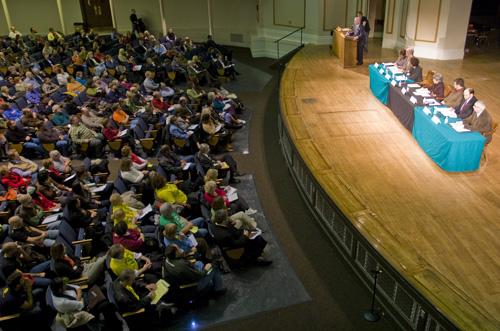Town meeting fails to calm budget fears

Erica Magda
Jan 23, 2009
Last updated on May 13, 2016 at 06:57 p.m.
University Chancellor Richard Herman was met with opposition Thursday night during an open meeting about the University’s budget crisis.
In the midst of the nation’s economic plight and Illinois Gov. Rod Blagojevich’s corruption scandal, University officials are estimating that as much as 10 percent will have to be trimmed from the University’s budget.
University officials say they cannot make definite plans because the state has not announced any decisions.
“We are here to talk with you, not at you,” Herman said. “(I) promise you transparency and openness.”
Get The Daily Illini in your inbox!
Staff members may have to take furlough as 80 percent of the University’s budget is spent paying staff salaries, said Provost Linda Katehi. Although the Chancellor said he could not speculate on possible cuts, service workers expressed concern that their jobs are in danger.
“Our first goal was to expose the fact that the people who make this University work were excluded from the panel,” said Jeff Bigelow, regional director for the American Federation of State, County and Municipal Employees, which is the largest public employee and health care union in the United States.
He said he wanted to hear that the lowest-paid workers will not be laid off. Herman expressed the desire to stay focused and compete for funds in Washington, D.C., and in Springfield, Ill.
“We are a healthy part of the future. We need investments in our students and our faculty,” Herman said.
Ingbert Floyd, member of the Graduate Employees Organization, said he did not think the Chancellor and his panel were serious enough.
“There was a lot of non-answering going on,” Floyd said. “We’re waiting to see action.”
He added that although he knows the University does not have all the answers at this point, the Graduate Employees Organization has made efforts to speak with Chancellor Herman and other administrators but have been rejected.
Before allowing audience participation, Katehi introduced the University’s priorities when making economic decisions as protecting the quality of core programs, serving students and others who depend on the University, and minimizing adverse effects on everyone connected to the University.
In addition to the recession, the University has to deal with a continuing decline in state funds, which Katehi said have been reduced by almost 50 percent since 1989. Also, the University’s utility expenses have increased between 30 and 35 percent in the past two years.
“The cut…will come at a difficult time for us,” Katehi said.
Audience members were not satisfied and expressed discontent with the current handling of the situation.
Kerry Pimblott, co-president of the Graduate Employees Union, said she wanted the speakers to be more specific about protecting workers’ interests and said cuts should start at the highest-paid positions.
At this point all colleges are restricting new hires to positions that are important to students and the services provided. State-funded travel is being limited to areas that support program development and bring in money. Only critical purchases, affecting the three introduced values, will be made. Katehi said the University is also creating long-term plans that will lead to more flexible, better service that costs less to provide. She added that the University is looking to minimize what it spends on support services. A business methodology will also be used to improve quality and reduce the cost of delivering support services.





